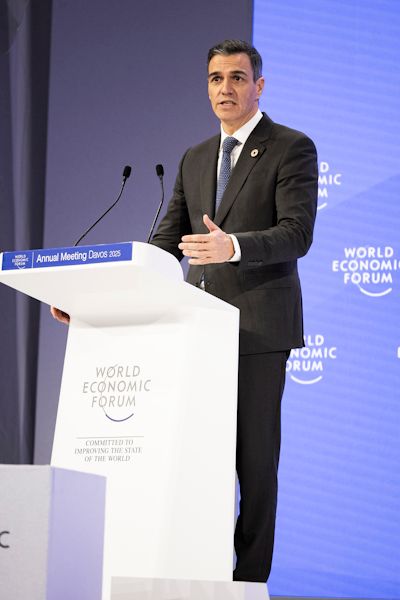
At Davos, Spanish PM Sánchez Proposes Cracking Down on Digital Freedoms to Protect Democracy
Spanish Prime Minister Pedro Sánchez used his time at the lectern this year in Davos to deliver a blistering speech excoriating social media companies for a litany of harms, including “cyberbullying, hate speech, sex offences, privacy violations, and a terrible rise of anxiety, violence, and loneliness.” If he had stopped there, his speech would have garnered little attention. After all, many policymakers routinely blame technology for society’s ills, oversimplifying complex problems while ignoring their longstanding antecedents and contributing factors. What was startling was not Sánchez’s chief complaint—that social media is “harming the liberal order and the democratic system”—but his proposed solution: He demanded radical reforms that would fundamentally curtail digital freedoms online.

Sánchez’s critique of social media, which he referred to as “the tool of our own oppression,” focused on three primary concerns. First, he claimed social media is “oversimplifying and polarizing the public debate.” Second, he accused platforms of “fostering misinformation.” Finally, he argued that they create “a rigged battlefield filled with manipulation, censorship, and falsehood.” In essence, Sánchez believes social media undermines legitimate public discourse. Moreover, he cynically argues that the executives of social media companies have intentionally created such an environment because it is “good for business” and helps “advance their political agenda.” He was unambiguous in his accusations, asserting “the tech billionaires want to overthrow democracy.”
Leaving aside the irony of denouncing the “power of the elite” while delivering a keynote address at one of the world’s most exclusive conferences in the Swiss Alps, Sánchez’s portrayal of social media as a scourge on democracy reflects the conventional wisdom in many policy circles. Yet his argument is ultimately misguided. Social media may not be the savior of democracy, but neither is it democracy’s foe. Instead, it is a tool used by both legitimate and illegitimate actors. Politicians often criticize social media when it undermines their interests but celebrate when it mobilizes their supporters. Or they demand that social media censor content they disapprove of, even when the same speech remains legal offline. Such complaints are transparently opportunistic. Moreover, government leaders should not try to shift responsibility to the private sector when governments themselves have not succeeded in stopping bad actors. For example, Russia and Iran continue to exploit social media to interfere in elections because they face few meaningful consequences from Western governments. Zuckerberg and Musk are not the ones who should be holding Putin accountable.
While Sánchez’s diagnosis is flawed, his proposed cures are even worse. To fix social media, he called for “an end to anonymity on social media.” He demanded that governments “force open the black box of social media algorithms.” And he insisted that “social media CEOs are held personally accountable.” He also likened the management of social media to the management of global commons, “like the oceans.” In short, Sánchez’s vision for fixing social media involves stripping users of online privacy, seizing the intellectual property of private companies, imprisoning business leaders for not censoring enough speech, and placing governments in control of private enterprises. This approach to protecting democracy bears an unsettling resemblance to Orwellian authoritarianism.
Democracy thrives on open debate and the protection of individual freedoms, including digital ones. While social media poses challenges, curtailing civil liberties and privatizing governance is not the answer. The techlash has become so potent that policymakers seem to overlook such obvious concerns as the risks of authoritarian overreach. Policymakers should strike a balance between accountability and liberty, ensuring that efforts to regulate technology do not come at the expense of the very democratic values they aim to protect.
Image credit: World Economic Forum.

